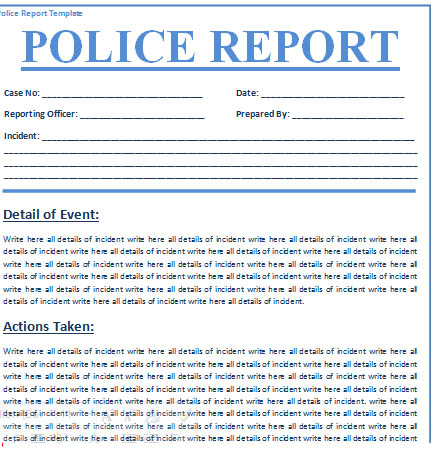Free Reports Online Police Records

Criminal records show the legal troubles an individual has encountered, including felonies, misdemeanors, and violations. State Police Department. Free Public Police Arrest Records check is a good starting point for checking someone's background. It is basically a compilation of all Police Reports relating to.

Today's technology makes it easy to find a wealth of information about people; however, gaining access to a reliable (or even official) criminal record or criminal background check isn't always as easy as using a search engine. Criminal Records Defined A criminal record—or “rap sheet'—is a record of a person's criminal history.
Often, the criminal record includes a compilation of local, state, and federal criminal information. Aside from criminal history information, the record also includes the person's: • Name and known aliases. • Date of birth. • Photograph. • Fingerprints. Depending on geographic location and the law enforcement or other government agency responsible for the record, a criminal record can include more than just misdemeanor or felony convictions. Other items on a criminal record may include: • Past arrests.
• Current pending charges. • Dismissed charges. Friends Season 5 Episode 23 Torrent Download. • Acquitted charges. However, criminal records typically don't include.
Using Criminal Records Many agencies and organizations request criminal records or run background checks for a variety of reasons, including: • Employment. Automotive Craftsman Repair Tool. • Some businesses are required to run background checks on prospective employees, including: • Government agencies.
• Medical professionals. • Companies or organizations where workers handle large amounts of money.
• Usually, privately owned businesses can use their own discretion when deciding whether to run a background check. • School admittance.
• Most commonly, colleges for law and medical professions check an applicant's criminal record. • Property rental. • Military service. • Security clearance. • Purchasing firearms.
• Under federal law, felons can't purchase or own firearms; however, depending on the situation, some felons can apply to have their gun rights restored. • Adopting or fostering children. • Certain types of licenses, such as applying for a CDL. • Not all states allow residents with felonies to vote; however, some states restore voting privileges after the person has met all penalty requirements (i.e. Jail time, parole, or probation). • Purposes related to visas, immigration, naturalization, and international travel.
• Law enforcement purposes, such as compiling possible suspects for a criminal investigation. As you can see, a criminal record can affect many areas of everyday life, but understand that having a criminal record doesn't automatically disqualify you from things you need (for example, having a criminal record doesn't mean you can't go to college at all).
The best way to determine how your criminal record will affect a certain aspect of your life is to speak with a criminal attorney (preferably one local to your area) or someone directly related to the event (such as a military recruiter). Accessing Your Criminal History Generally, when a person is convicted of a crime, it becomes public record; in fact, sometimes searching a person's criminal history is as easy as visiting the courthouse or checking another public database. This is often the case for people who are looking into their own criminal records.
However, depending on someone's situation and just how deeply you want to search a person's criminal record, you might have to officially request access—and, depending on who you are and your purposes, you could be denied access altogether. Government Agencies Most government agencies have no problem accessing someone's criminal record; however, regarding voluntary situations, the agency might require your consent. Non-Government Agencies Most often, you must give your consent for any person, agency, or organization not affiliated with the government or law enforcement to access your criminal record related to certain eligibility purposes. For example, background checks are required to purchase firearms, but a firearms dealer can't access your criminal record if you aren't trying to purchase a gun. Similarly, some schools, colleges, and universities require background checks for admittance; however, staff members can't search your record without your permission. Of course, refusing to grant access is a red flag, and often a deal breaker.
General Public Again, some criminal records are considered public records; others aren't. Generally, this relates to the specific record. Driver Epson Perfection 1250 Photo Windows 7 64 Bits.
For example, some states allow the general public access to a person's criminal record, but not the person's background check. Often, states set their own definitions for “criminal records' and “background checks,' but understand that—in most cases—criminal records are more thorough. For example: • A background check can tell you about a person's: • Current and sometimes past addresses. • Marital or divorced status. • Bankruptcy filing history. • Felony status or serious driving offenses (e.g., DUI). • A criminal record check includes information about: • Specific arrests, convictions, penalties (such as prison time, probation, and parole).
Most Popular Articles
- Oxycube S40 Edition
- Sap Press Books Download Free
- Download Save Game Yugioh Forbidden Memories Full Cardigan
- Sox Iso 27001 Mapping A Drive
- Statik Selektah 100 Proof The Hangover Zippyshare
- Metro A Responsive Theme For Phpbb 3 Shoutbox
- Checkers Buddy Yahoo Serial
- Harman Kardon Software Update Avr 1700 Manual
- Reggae Anthology Winston Riley Quintessential Techniques Rar Download
- Simple Commission Calculation Program Part 2
- Copernic Agent Professional 6.12 + Key Gen
- Colorvision Spyder 2 Express Driver Windows 7
- Tamil Christian Songs Lyrics With Chords Free Download
- Download Rom Pokemon X Y Gba
- Esbjorn Svensson Trio 301 Rar Download
- Simpson Silencio 972 User Manual